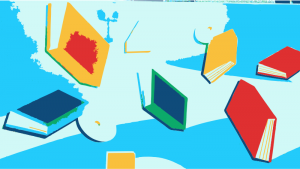Help us protect the commons. Make a tax deductible gift to fund our work. Donate today!

“Book graphic extraction 1” by rejon is marked with CC0 1.0.
Yesterday, the Electronic Frontier Foundation (EFF) filed a motion for summary judgment calling to reject the lawsuit against the Internet Archive (IA) brought by four big publishers that threatens IA’s controlled digital lending (CDL) program. Creative Commons fully supports this motion. Here’s why.
The Internet Archive is an American non-profit library preserving and giving access to millions of free books, movies, software, music, websites, and more, with the mission to provide “universal access to all knowledge.”
As we mention in our Open Culture Policy Paper, with CDL, libraries can lend one copy of digitized material from their collection to one borrower at a time, for two weeks or less, just like they would a physical book. Unlike eLending, CDL is about digitized works, not born-digital material. CDL maximizes a library’s ability to loan works, thereby making the entire lending system more efficient and equitable.
At CC, we believe libraries — and cultural heritage institutions in general — should be empowered to serve as a meaningful access point for publicly funded collections. Free and open access to knowledge stimulates creativity, is essential for research and learning, and constitutes a bedrock principle of free and democratic societies.
Copyright must encourage CDL and ensure that legal mechanisms are in place to allow this fair practice. As clearly articulated by EFF: “CDL helps ensure that the public can make full use of the books that libraries have bought and paid for. This activity is fundamentally the same as traditional library lending, and poses no new harm to authors or the publishing industry.”
Books, in all their forms, are a public good. Libraries, whether brick-and-mortar or digital, pursue a public-interest mission. Guided by our strong belief in better sharing, CC will continue to support the IA’s crucial efforts to ensure the public can access knowledge and culture on a global level.
Posted 08 July 2022